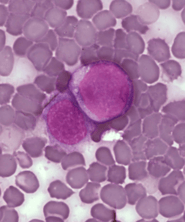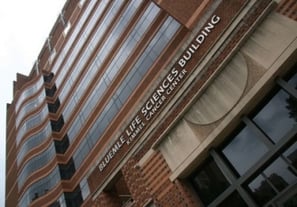The National Institutes of Health (NIH) awards the University of Arizona roughly 200 grants totaling about $100 million each year. In 2018 the numbers increased to 266 grants totaling $125,091,695. A large portion of this NIH research funding was awarded to the over 250 scientists included in the University's BIO5 Institute. Here are the top 10 BIO5 NIH grant recipients:
Read MoreTags: biomedical research, Biotech Event, Alzheimer's Research, UAZ, Research Funding, NIH funding, NIH grant, University of Arizona Tucson, UA, cancer research funding, cancer research grant, Asthma research, BioResearch Product Faire™, Cancer Diagnostics, cytomegalovirus, Valley Fever, virus research, BIO5 Institute
Ovarian cancer has a mortality rate of up to 70%. This is partly due to the fact that the disease is rarely detected in its early stages because the symptoms are vague and nonspecific. Currently, there is no accepted screening method for ovarian cancer. Due to the mortality rate, physicians often counsel women at high risk to have their ovaries and fallopian tubes removed as a precaution. Jennifer Barton, director of University of Arizona’s BIO5 Institute wants to change all this. With $863,000 from the United States Army and nearly $500,000 from the NIH in research funding, her plans for a falloposcope that will detect early-stage ovarian cancer is moving forward.
Read MoreTags: biomedical research, Biotech Event, UAZ, Research Funding, NIH funding, NIH grant, University of Arizona Tucson, UA, cancer research funding, cancer research grant, ovarian cancer, BioResearch Product Faire™, Cancer Diagnostics, NIDA, BIO5 Institute

UC Davis Medical Center is home to one of only 49 National Cancer Institute (NCI) designated comprehensive cancer centers. The UC Davis Center is the only comprehensive cancer center in California’s Central Valley and inland northern California. It serves a region with a population of roughly 6 million people. The Center has $63 million in NHI and California Healthcare Institute funding.
The NCI, a division of the NIH, awards University of California, Davis roughly $200 million annually to conduct cancer research.
Here are the top 5 NCI grants this year:
Read More
Tags: CA, University of California Davis Medical Center, Southwest, NIH funded Research Projects, UCDMC, BioResearch Product Faire Event, biotech vendor show, Sacramento, cancer research funding, Comprehensive Cancer Center, Oncology, Cancer Immunotherapy, Cancer Science
Richard and Susan Rogal recently committed $150,000,000 to the University of Michigan Comprehensive Cancer Center. It is the largest gift ever been made to Michigan Medicine. The money will be used to support promising cancer research and help train the next generation of researchers.
Read MoreTags: University of Michigan, new research funding, University Research, Michigan, University of Michigan Ann Arbor, MI, laboratory equipment suppliers, UMich, Midwest Region, research news, cancer research funding, cancer research grant, BioResearch Product Faire, cancer reserach, NIH awards 2017, 2017 research funding, University of Michigan research, university research funding
Proctor & Gamble will give to give $10 Million to support research and outcomes at Cincinnati Cancer Center (CCC), a collaboration of the University of Cincinnati (UC), UC Health, and Cincinnati Children’s Hospital. The gift will fund recruitment and research enhancements that will assist with the center’s pursuit of achieving the designation of Comprehensive Cancer Center from the National Center Institute.
Tags: University of Cincinnati, BioResearch Product Faire Event, Cincinnati, OH, laboratory equipment, laboratory equipment suppliers, UCinci, lab suppliers, laboratory equipment sales, cancer research funding, BioResearch Product Faire, Comprehensive Cancer Center

Of the four main types of Leukemia, Acute Myeloid Leukemia (AML) diagnoses make up nearly one-third of new leukemia cases and is most likely to occur in adults. Although common cancer treatment methods are used for AML patients, only about half go into remission after chemotherapy treatments. Factors such as age and overall health contribute to these remission rates. Researchers at top life science institutions around the world continually study AML to gain better understandings of the biology of this cancer that can lead to new and more effect treatment methods. (Image courtesy Wikimedia Commons)
Read MoreTags: CA, Leukemia, new research funding, cancer research, San Diego, SDVS, UCSD, Biotechnology Vendor Showcase, cancer research funding, 2018, AML Research, Acute Myeloid Leukemia
 The state of Texas is striving to increase cancer research capabilities and opportunities with the Cancer Prevention and Research Institute of Texas (CPRIT). One method that CPRIT uses to increase cancer research opportunities throughout the state is through the institutes core facility support awards, which provide more funding and opportunities for researchers from different Texas institutions. Recently, researchers from Texas A&M University received a $5.7 million grant from CPRIT to expand cancer research at the university through this additional core facility funding. (Image courtesy of Aggie0083 via Wikimedia Commons)
The state of Texas is striving to increase cancer research capabilities and opportunities with the Cancer Prevention and Research Institute of Texas (CPRIT). One method that CPRIT uses to increase cancer research opportunities throughout the state is through the institutes core facility support awards, which provide more funding and opportunities for researchers from different Texas institutions. Recently, researchers from Texas A&M University received a $5.7 million grant from CPRIT to expand cancer research at the university through this additional core facility funding. (Image courtesy of Aggie0083 via Wikimedia Commons)
Tags: Texas A&M University, Texas Medical Center, Texas, TAMU, tmc, BioResearch Product Faire Event, Houston, TX, cancer research funding, 2018, Baylor College of Medicine, core facility funding
According to the National Cancer Institute (NCI) there are over 380,000 people living with leukemia in the United States. Each year roughly 24,500 people die from the disease and over 62,000 new cases are diagnosed. To improve treatment options for leukemia patients, the NCI recently awarded John DiPersio, MD, PhD of Washington University, St. Louis $6 million in research funding. The Professor of Medicine in Oncology at the university’s School of Medicine will use the seven years of funding to support three major areas of leukemia research in his lab. These include: improving the effectiveness of standard chemotherapy, preventing graft-versus-host disease, and developing new immunotherapies.
Read MoreTags: Washington University St. Louis, Washington University, WashU, WUSTL, Leukemia, cancer research, Cancer, Research Funding, biotech vendor show, cancer research funding, Bioresearch Grant, Biotechnology trade show, NIH awards 2017, Cancer Therapeutics, Cancer Immunotherapy

Each year, The Sidney Kimmel Cancer Center (SKCC) at Jefferson University Hospital receives approximately $72 million in grants for cancer research from organizations such as Susan Komen for the Cure. This year the SKCC received a $3 million donation from Esperanza and David Neu in order to establish the Neu Center for Supportive Medicine and Cancer Survivorship. The purpose of the Neu Center is to serve as a comprehensive resource for psycho-social care and research.
Read MoreTags: Pennsylvania, Northeast, Thomas Jefferson University, cancer research, NIH funded Research Projects, Philadelphia, PA, NIH funding, Cancer Center, ThomJeff, cancer research funding, BioResearch Product Faire, NIH awards 2017, 2017 research funding
The University of Minnesota is one of the top research universities globally. Year after year, research programs continue to grow as the University attracts top scientists, to enjoy the academic and cultural setting that is offered on the Twin Cities Campus.
Read MoreTags: University of Minnesota, cancer research, Minnesota, University of Minnesota Twin Cities, Research Funding, MN, UMinn, Midwest Region, new research grant, cancer research funding

